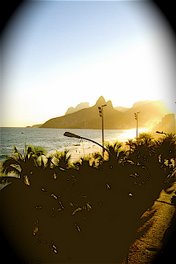Initially I had planned to write about film noir, there is so much to write about the genre. Besides, I love it.
However, the circumstances of politics in Brazil, the friends I spoke with before Sunday's elections, their differences now, when thirty years ago we were all united against the military Redeemer, for the creation of the workers' party, Partido dos Trabalhadores, made me choose "City of God," instead.
In 2002 I flew to Rio on a cheap-o flight with United. Old time friends were finally getting married, after having lived together over a couple of decades. If I would be lucky I would be in Rio for Lula's victory. Unfortunately he had to go for a second round.
Monday morning I got a call about the silencing of Rio, beach area included, small bombs in Ipanema, machine gun threats, unusual violence for the folks who live at the beat of bossa nova, boats, the beach, easy affluence. I boarded my cheap-o United flight anyway. This time I stayed in Laranjeiras, the wedding would be in Tijuca. My host knows so many people it's ridiculous to go for a walk with him. He's gladslapped every two steps of the way. He was invited to go to a preview of City of God. I invited the photographer who is a character in the film, Rogerio Reis, the actual photographer for Jornal do Brasil at Cidade de Deus in the seventies to eighties, his better-half, a friend. This is typical brasileiro fashion; invite one, twenty will show up.
Anthony Lane, one of the crrrrretins at the New Yorker, had nothing but despise for the film directed by Fernando Meirelles and Katia Lunt. He said the best actor in the film was the chicken.Trailler
The film shows how crime gets more and more sophisticated and criminals younger as time goes by, poverty unresolved, temptations stronger, from the late sixties to eighties. In the late sixties, the hoodlums resort to stealing petty cash from the truck delivering bottled gas. In a motel hold-up something goes wrong. Little kids murder a couple.
The older hoodlums are killed, younger ones take over. The cycle is an ongoing one. Life is cheap if you are poor. Cocaine makes it grand appearance. Middle class kids mingle with the ones from Cidade de Deus, a project of relocation of the poor from the beach area, a project never quite completed in its infra-structure. It's a City of Hell.
The really young kids, 9-10 years old take over in the end, kill the really mean guy, Li'l Zé. And they swear they aren't afraid of that guy, Comando Vermelho. Comando Vermelho was a group of organized traffickers of dope and guns.
It is true Fernando Meirelles is a product of commercials, as were the brothers Tony and Riddley Scott. It might have been this apect of the filmography that A. Lane didn't like. Camera angles in every-which-way, zooms, turn-around, 360 degrees.
I thoroughly enjoyed it when I saw it in Rio. I brought my husband to see it at the Cinerama Dome, aka Arclight Cinema. At this festival a lot of people walked out during the film. I myself felt more unsettled with the violence on the screen when watching the film here in Los Angeles.
Katia Lunt was the coach for all the kids, there are maybe one hundred of them. It's fascinating to hear about how she worked with all the children. Unlike the producers of Pixote, the people who generated Cidade de Deus are following through with the kids to try to avoid a tragic ending for them.
This is a heavy duty film about an unpleasant reality of one of the bottom three countries in wealth distribution. Sonia Braga's niece, Maria Alice, plays a small part. It is a must see for people here in the USA to think of what happens when all the wealth goes to that one per cent of the population. Don't forget to vote!
VOTE DEMOCRAT VOTE DEMOCRAT VOTE DEMOCRAT VOTE DEMOCRAT VOTE DEMOCRAT VOTE DEMOCRAT VOTE DEMOCRAT VOTE DEMOCRAT VOTE DEMOCRAT
Monday, October 30, 2006
Subscribe to:
Post Comments (Atom)


No comments:
Post a Comment